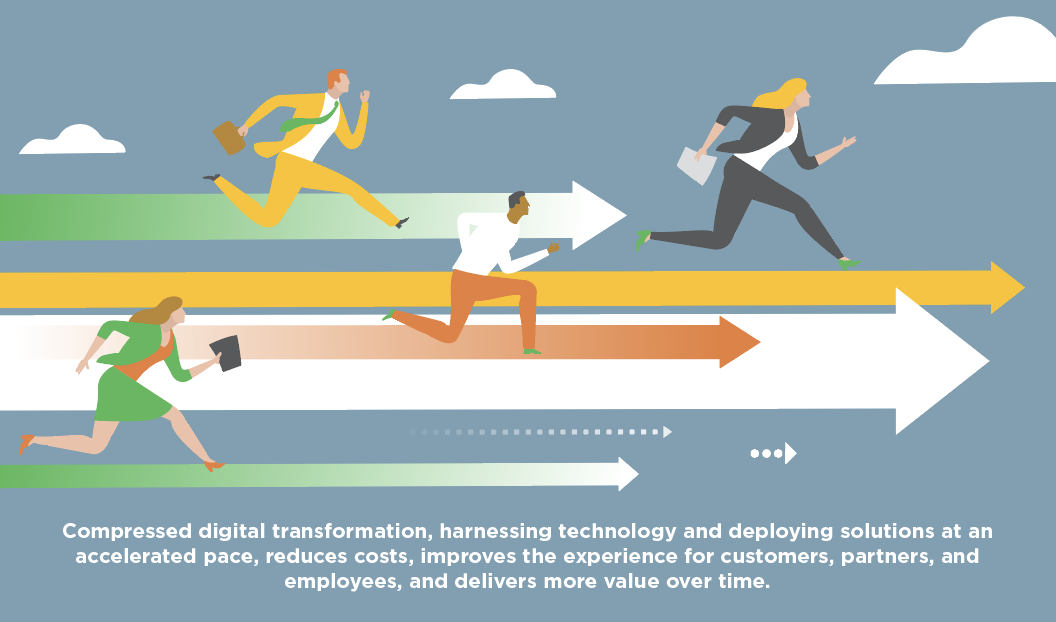Digital transformation is a strategic imperative in today’s rapidly evolving business landscape. This priority is particularly evident in supply chain management, where the need to adapt and innovate has accelerated due to unique challenges posed by the global pandemic, economic uncertainty, supply chain disruptions, and labor shortages. Read on to explore the rise of compressed digital transformations and how cloud technology empowers organizations to navigate these changes effectively.
Factors contributing to compressed transformation in the supply chain
Compressed digital transformation refers to the strategy that involves looking across the entire organization’s operations, choosing a single approach to the transformation, finding the right partner, and reimagining the business end-to-end. This approach of harnessing technology and deploying solutions at an accelerated pace reduces costs, improves the experience for customers, partners, and employees, and delivers more value over time.
There are a few most significant factors behind the rise of compressed digital transformations in the supply chain today, including:
- The COVID-19 pandemic:
The global health crisis disrupted supply chains worldwide, revealing vulnerabilities and inefficiencies and requiring teams to adopt digital solutions that enabled remote work, ensured resilience, and supported shifting customer demands quickly. According to Accenture’s Sandeep Dutta, companies leading in technology adoption and innovation grew at two times the rate of laggards before the pandemic. In the face of COVID-19, companies have compressed digital transformation, and leaders are growing five times faster than slow adopters — widening the gap even further.
- Emerging technologies:
Emerging innovations, from the Internet of Things (IoT) and Artificial Intelligence (AI) to blockchain technology, are revolutionizing supply chain management. Amid fast-paced technological advances, organizations are racing to integrate new solutions to promote operational excellence and gain a competitive advantage, compressing timelines for digital transformation even further. Gartner reports that a staggering 91% of businesses are engaged in some form of digital initiative, while 87% of senior business leaders say digitization is a priority moving forward.
- Changing customer expectations:
According to the Intercom Customer Service Trends Report for 2023, 83% of support teams are seeing customer expectations increase, up from 75% in 2022. With consumers increasingly expecting real-time visibility, personalized experiences, and improved product sustainability, successfully meeting these demands necessitates creating a more agile and tech-savvy supply chain in an accelerated timeline.

Leverage cloud adoption as a catalyst for transformation
Today, cloud technology serves as a powerful enabler of compressed digital transformations. Adopting cloud-based solutions as the foundation for supply chain management provides teams with a host of benefits and quick wins, including:
- Scalability: By implementing cloud-powered technologies, companies can scale solutions up or down as needed. This flexibility ensures organizations adapt to fluctuations in demand when they arise.
- Cost-efficiency: Opting for cloud computing effectively reduces capital expenses on infrastructure, allowing organizations to only pay for the resources they use.
- Real-time data insights: Cloud-based analytics provide access to real-time data. These insights empower better decision-making and more proactive responses to disruptions.
- Enhanced collaboration: With a cloud platform as a foundation, organizations can facilitate improved collaboration between supply chain partners. These partnerships drive visibility and communication for all stakeholders.
Oracle Cloud technology stands out as a comprehensive solution with the functionality to support supply chain organizations in accelerating their digital transformations. The robust Oracle tools and services suite seamlessly integrates with existing systems, enabling smooth and efficient compressed transformations.
Overcoming potential challenges and resistance
While the advantages of cloud adoption in the supply chain are clear, there are a few potential challenges and common misconceptions organizations may face when implementing compressed transformations:
- Resistance to change:
The Boston Consulting Group reports that only 30% of digital transformations achieve their objectives, and the main reason for failure is employee resistance. To minimize opposition to new technologies and processes, teams can provide comprehensive training programs, involve employees in decision-making, and establish clear channels for communication and feedback.
- Security and data privacy:
The widespread adoption of emerging technologies is causing data security and privacy concerns. Fortunately, cloud providers like Oracle ensure robust security measures are in place to reduce the potential for cyber threats or data breaches. Organizations can also introduce added safeguards to minimize risks, such as multi-factor authentication, encryption protocols, and regular security audits.
Strategies to accelerate cloud adoption and digital transformation
To tackle successfully cloud-powered compressed digital transformation, supply chain teams need a roadmap outlining their anticipated transformation. Oracle’s approach to cloud technology and digital transformation provides a valuable guide for teams embarking on this journey. The top strategies to foster successful transformation include:
- Defining clear objectives: It is critical to set predetermined objectives from the beginning of the process, defining a clear plan to move forward and a strategy that aligns with business goals.
- Involving key stakeholders: Ensure that all relevant players stay informed and engaged throughout the transformation process to boost support for these changes and more efficient collaboration in the long run.
- Investing in training: Provide employees with comprehensive training to help them feel confident handling new technologies. These resources effectively reduce employee resistance to digital change.
- Collaborating effectively: Improve communication and teamwork across departments and partners to streamline transformation efforts and boost visibility over the entire supply chain.
- Improving continuously: Compressed digital transformation necessitates accelerated change, but these updates do not stop after implementation. Instill a culture of continuous improvement, where feedback and lessons learned help refine digital strategies.
Regardless of where an organization exists on its digital transformation journey, it is essential to recognize that delaying technology adoption is ultimately more costly than embracing these changes. To take on these developments with enthusiasm and break free from traditional processes, the Inspirage, Part of Accenture, team offers Oracle Cloud experts to support compressed digital transformation. Ready to accelerate digital transformation and navigate the complex supply chain management landscape more effectively? Contact us today to learn more about our customized solutions and world-class Oracle Cloud expertise.